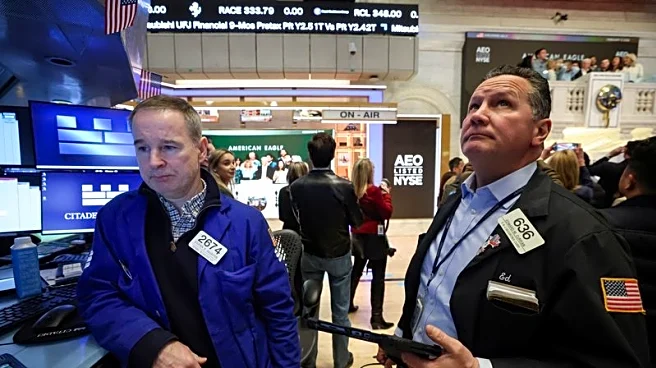What's Happening?
Garrett Wareing, star of the film adaptation of Stephen King's 'The Long Walk,' shared insights into his character, Stebbins, and the film's themes. The movie, directed by Francis Lawrence, follows 50 young men in a dystopian competition where the last man standing wins, and those who fall behind are eliminated. Wareing, who initially auditioned for a different role, was drawn to Stebbins due to his complex backstory and emotional depth. The film explores themes of camaraderie, companionship, and the harsh realities of the competition. Wareing highlighted the physical and emotional demands of the role, noting the significance of Stebbins' relationship with his father, The Major, played by Mark Hamill. The film's narrative and Wareing's performance aim to convey a message of hope amidst the dystopian setting.
Why It's Important?
The adaptation of 'The Long Walk' adds to the conversation around dystopian narratives in film, a genre popularized by series like 'The Hunger Games' and 'Divergent.' This film, based on a novel that predates these series, offers a fresh perspective on the genre, emphasizing emotional depth and character development. For audiences, it provides a reflection on societal structures and the human condition under extreme circumstances. The film's release could influence future adaptations of dystopian literature, highlighting the importance of character-driven stories. Additionally, Wareing's portrayal of Stebbins may resonate with viewers, offering a nuanced look at personal growth and resilience.
What's Next?
As 'The Long Walk' reaches audiences, its reception could impact future adaptations of Stephen King's works, potentially encouraging more character-focused narratives. The film's themes may spark discussions on the portrayal of dystopian societies in media, influencing filmmakers and writers. Wareing's performance might open new opportunities for him in the industry, particularly in roles that require emotional complexity. The film's success could also lead to increased interest in similar adaptations, shaping the landscape of dystopian cinema.
Beyond the Headlines
The film's exploration of themes such as camaraderie and the human spirit under duress may have broader cultural implications, encouraging viewers to reflect on their values and relationships. The narrative's focus on personal sacrifice and the quest for identity could resonate with audiences, prompting discussions on societal expectations and individual agency. The adaptation's success might also highlight the enduring appeal of Stephen King's storytelling, reinforcing his influence on contemporary literature and film.












